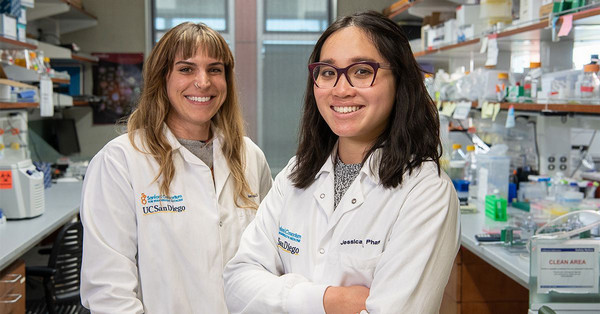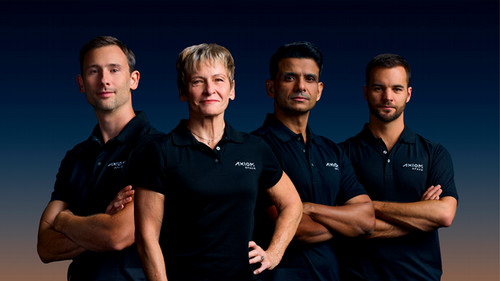UC San Diego Sanford Stem Cell Institute readies cancer drug for experiments in space, clinical trial on Earth
The results of this spring’s International Space Station-based research will help shape the way scientists think about drug development terrestrially
 Rebecsinib — an anti-cancer drug developed by UC San Diego Sanford Stem Cell Institute Director Catriona Jamieson, M.D., Ph.D., and her team — is “go for launch.”
Rebecsinib — an anti-cancer drug developed by UC San Diego Sanford Stem Cell Institute Director Catriona Jamieson, M.D., Ph.D., and her team — is “go for launch.”
The U.S. Food and Drug Administration this spring green-lit the experimental therapeutic for a Phase 1 clinical trial, making it the first and only ADAR1 inhibitor with an approved investigational new drug application.
Clinical trial aside, the drug itself is also “go for launch,” ready to rocket to the cosmos for further testing aboard Axiom Space’s Ax-4 Mission, scheduled to launch at 8 a.m. ET Wednesday, June 11, from NASA’s Kennedy Space Center on Merritt Island, Florida, weather permitting.
"We're thrilled to take this drug from the bench — and a bench on the International Space Station, even — to the bedside of patients who need it most,” said Jamieson, a leading stem cell biologist and board-certified hematologist with broad clinical expertise in caring for patients with blood cancers.
In the U.S., approximately 40% of people will be diagnosed with cancer in their lifetime, according to the American Cancer Society. A sizable percentage of cancer deaths are due not to the onset of the disease, but to recurrence and spread.
"Rebecsinib shows all the promise in the world not only to halt the progression of multiple cancers, but to shrink them, as well as prevent their spread to other sites in the body,” Jamieson said.
New drug holds potential for 23 cancers
During the Ax-4 mission, astronauts aboard the International Space Station will test the efficacy of rebecsinib on tumor organoids derived from the cancer stem cells of consenting patients with secondary acute myeloid leukemia, ovarian cancer, metastatic breast cancer and glioblastoma multiforme. The drug holds potential to fight 23 types of cancer — any that involve ADAR1 in their development and progression.
The hope is that the investigational new drug prevents the miniature tumors from growing, as it did on Axiom Space’s previous Ax-3 mission, with cell line-derived triple negative breast cancer tumor organoids. On that mission, completed in early 2024, the small molecule inhibitor acted as a sort of cancer “kill switch" by halting the growth of ADAR1-expressing breast cancer organoids.
Back on Earth, start-up activities have begun for rebecsinib’s Phase 1 clinical trial, for patients with relapsed or refractory secondary acute myeloid leukemia or higher-risk myelofibrosis. Under it, as many as 66 enrolled patients will be granted access to the medication.
Different interstellar experiment focuses on aging
Jamieson’s team is leading another scientific investigation aboard Ax-4: Space Associated Stem Cell Hallmarks of Aging (SASHA) in Astronauts, which will focus on how space travel affects blood stem cell aging. Specifically, it will examine the roles of two enzymes, APOBEC and ADAR1, that are linked to inflammation and stem cell aging — key factors in many diseases — as well as pre-cancer initiation.
By studying how these enzymes affect stem cells and the acquisition of mutations during spaceflight, SSCI’s Integrated Space Stem Cell Orbital Research (ISSCOR) Center team will augment findings from two prior Axiom Space missions, rounding out essential insights into accelerated stem cell aging under conditions of physiological stress.
In low-Earth orbit, the weak pull of gravity — also known as microgravity — stresses cells and promotes inflammation, causing accelerated cellular aging. When scientists send organoids — miniature versions of cancerous tumors or organs created from human stem cells — to space, each month can provide a preview of several years of disease development and progression.
The environmental stress and inflammatory cytokine signaling caused by microgravity also accelerate ADAR1 activation in malignancies. Because of this, microgravity offers Jamieson's team a unique opportunity to expeditiously determine rebecsinib's efficacy against different types of cancer.
Jamieson received the prestigious International Space Station National Laboratory 2024 Compelling Results Award in Biology and Medicine — for her discovery that rebecsinib blocks the activation of ADAR1 in cancer — last summer.



